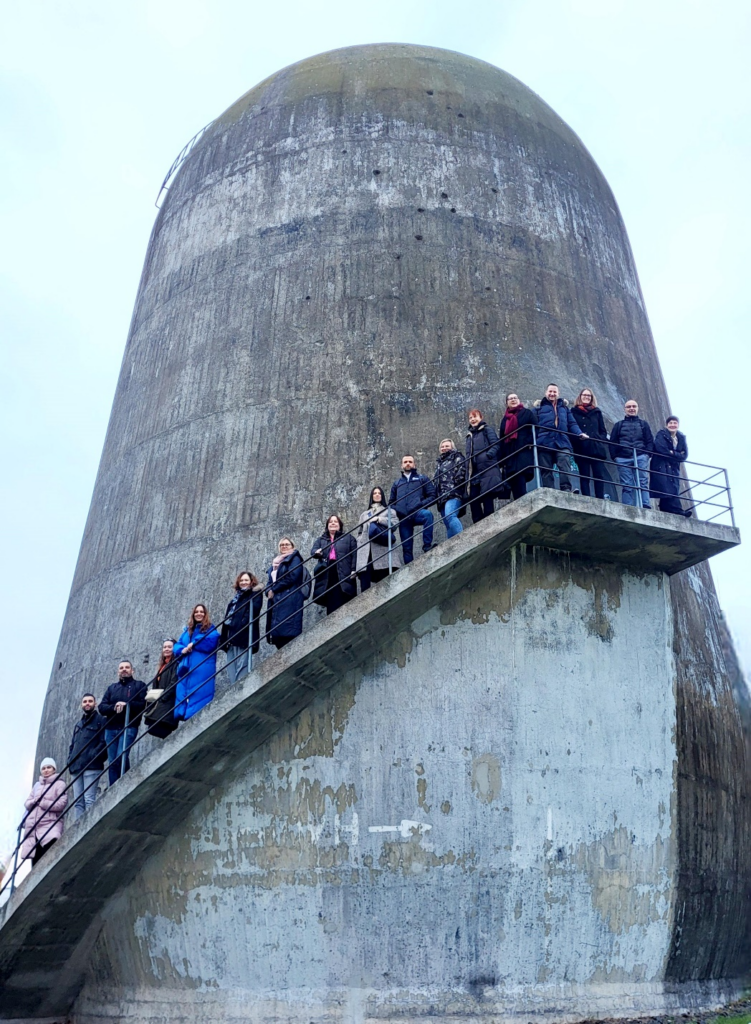
ERA-Shuttle delegates on the “Trudelturm,” the historic tailspin wind canal in Adlershof. Photo credit: Helge Oswald.
Berlin-Adlershof is Germany’s largest science and technology park that hosts a diverse ecosystem of research institutions, startups, and established companies. It combines innovative research with business development, fostering collaboration between academia and industry. The park features state-of-the-art facilities and infrastructure, making it a key hub for knowledge transfer and technological advancement in Germany. That makes it the ideal place for our first ERA-Shuttle study visit, which took place from 2 nd to 4th December 2024. We sent high-level university delegations for a three-day study visit to Adlershof. This fruitful exchange of ideas emphasized the challenges and strategies for personnel retention in academia, showcasing inspiring perspectives from various experts. The visit was hosted by ERA-Shuttle partner Steinbeis and we welcomed guest delegates from Odessa I. I. Mechanikov University and Kyiv Academic University.
Fostering lifelong learning: The role of alumni and a holistic approach
Day one was dedicated to exploring personnel retention strategies, underscored by the vital role alumni play in attracting talent back to their alma maters. As Anna Dzadkiewicz, dean at the University of Gdansk eloquently stated, “Reputation is everything.” This sentiment >resonated with the other participants, reinforcing the idea that a university’s standing significantly influences its ability to retain and attract skilled individuals. Elena Sultana highlighted the efforts the University of Malta is making in this direction, citing the EURAXESS Charter and Code for Researchers (Charter & Code for Researchers | EURAXESS)
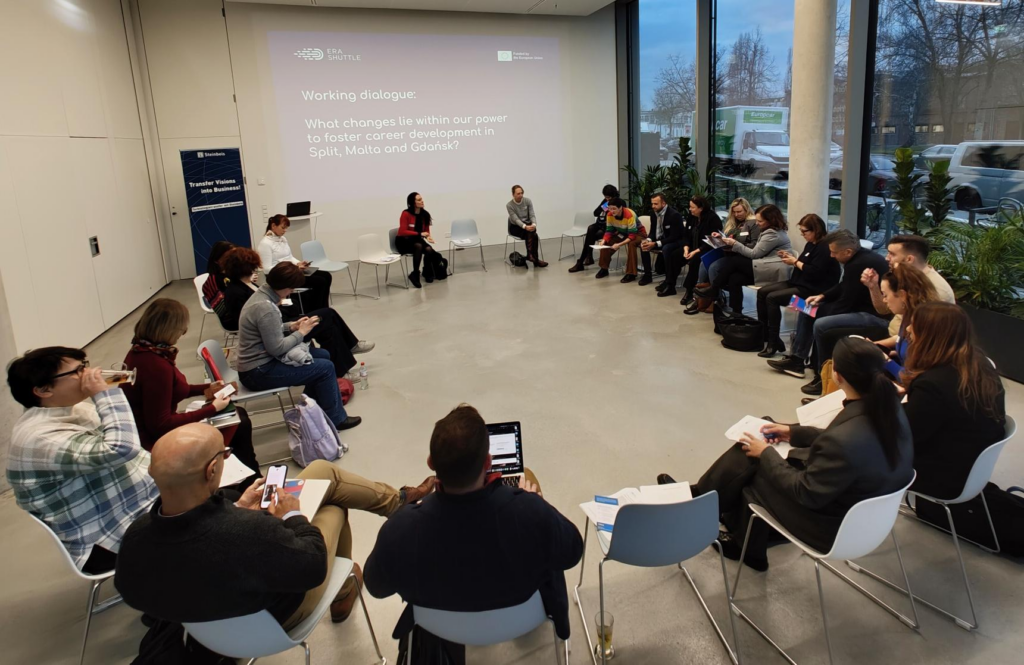
Group discussion about talent retention; “What changes lie within our power to foster career development in Split, Malta and Gdansk?” Photo credit: Frank Graage.
Bessie Fischer-Bohn of WISTA Management GmbH introduced a crucial takeaway: “Fix the system, not the person.” This holistic view argues for institutional change that supports diverse employee needs and values, rather than expect individuals to mould themselves to fit rigid frameworks. Clio Dosi from the University of Bologna further expanded this concept, advocating for growth and psychological flexibility supported by institutional frameworks. Clio encourages exploring resources such as ABC4E, where research meets actionable interventions aimed at nurturing personal and professional growth (https://phase2.attract-eu.com/projects/abc4e/ ).
Petya Jordan from Humboldt University reminded us that not all researchers can remain in academia and secure tenured positions. Instead, she emphasised the importance of empowering individuals to navigate their career paths, suggesting that the act of “reinventing your career” could mean “re-imagining your identity.” These presentations stimulated a lively discussion, moderated by Steinbeis’s Sonia Utermann. We rounded the first day off with a tour of the ST3AM makers’ space.
| Strategic foresight is crucial for universities, not just for private companies. When financial incentives are insufficient, universities should emphasize non-financial benefits like intellectual freedom, self-actualization, and purpose-driven work. Recognition and reward remain complex topics, with participants sharing resources for better solutions, and both researchers and research managers can benefit from developing identifiable profiles, as noted in the RM Roadmap. |
Innovation ecosystems: a shift from theory to practice
Day two began with Helge Oswald of Wista Management GmbH, who enthusiastically shared the history of the Aerodynamic Park in Adlershof. Neysha Lobo Ploch then guided delegates through the prototype lab at the Ferdinand-Braun-Institut FBH, aimed at bridging the gap between lab prototypes and market-ready products while fostering industry collaboration. Our visit to the Bundesanstalt für Materialprüfung und Forschung (BAM) featured Teresa Kollokowski discussing its unique technology transfer pillars, along with Carsten Engelhardt and Timm Schwaar showcasing innovations from the chemistry department and BAM spin-off company SAFIA. Overall, the day highlighted the diverse efforts within the Adlershof ecosystem.
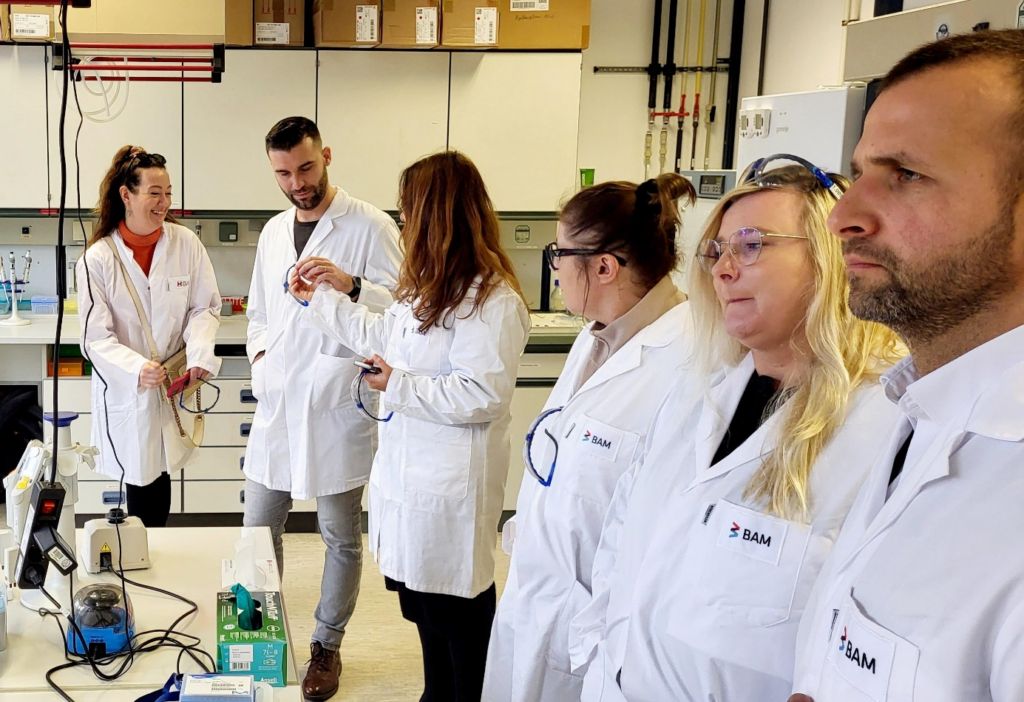
ERA-Shuttle delegates visiting BAM Spin-off company SAFIA. Photo credit: Sonia Utermann.
On the afternoon of day two, we explored innovation ecosystems in Eastern and Southern Europe, opening the session to a broader audience from Berlin, Brandenburg, and Saxony.
Oleksandra Antoniouk from Kyiv Academic University gave an introduction to innovation ecosystem theory, and a summary of her efforts to build Academ.City, the Kyiv Science park, with an initial budget of literally zero and during the invasion of her country. Her talk highlighted the longstanding collaboration between Academ.City and the Adlershof science park. Pawel Antonowicz introduced a novel strategy-building approach at the University of Gdansk that employs stakeholder consultation and AI tools to develop university strategies in just three days.
Rawad Chammas from Wista Management GmbH emphasized the importance of creating inclusive platforms to foster exchange in mature innovation ecosystems, referring to this as the “human element of technology transfer,” with the Adlershof Campus Club as an example. Madlen Köhler from Steinbeis shared insights on nurturing innovation in Saxony amid historical challenges, while Angela Zennaro, head of industry liaison at CERIC-ERIC, discussed the importance of developing industry partners’ understanding of analytical techniques to facilitate effective access to knowledge. The session concluded with discussions on enhancing the socio-economic impact of innovation and engaging younger audiences in science.
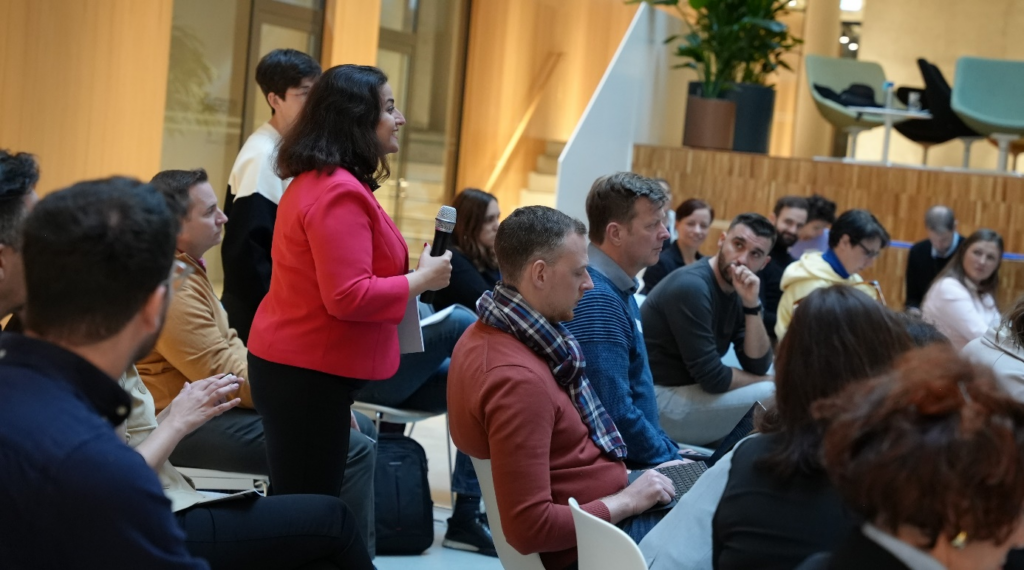
Passionate discussions during the panel dialogue. Photo credit: Julia Schumacher.
Closing reflections: actionable strategies for academia
On the final day, Dominika Butkiewicz of the University of Gdansk led discussions planning future ERA-Shuttle cross-sectoral trainings. Our world café brainstorming session helped crystallise the insights gained throughout the visit, identifying essential measures for enhancing talent retention in our institutions.
The key themes from our discussions highlighted:
1. Enhancing institutional profiles to attract diverse talent.
2. Empowering individuals while caring for their career legacies.
3. Adopting a human-centric approach that acknowledges diverse motivations and needs.
4. Balancing work-life commitments with the pursuit of intellectual freedom.

World Café: the table on knowledge transfer was hosted by Nikola Bejo (bottom left). Photo credit: Frank Graage.
As we move forward, it is crucial for our delegates to recognise the collective responsibility we share as educators and leaders in shaping the academic landscape. The insights gleaned from this enriching visit not only inspire us but also challenge us to implement actionable changes that will make a lasting impact on the future of our institutions and regions.
Let us take these insights, collaborate, and continue to build bridges across borders, ensuring a future where knowledge and talent can truly flourish.
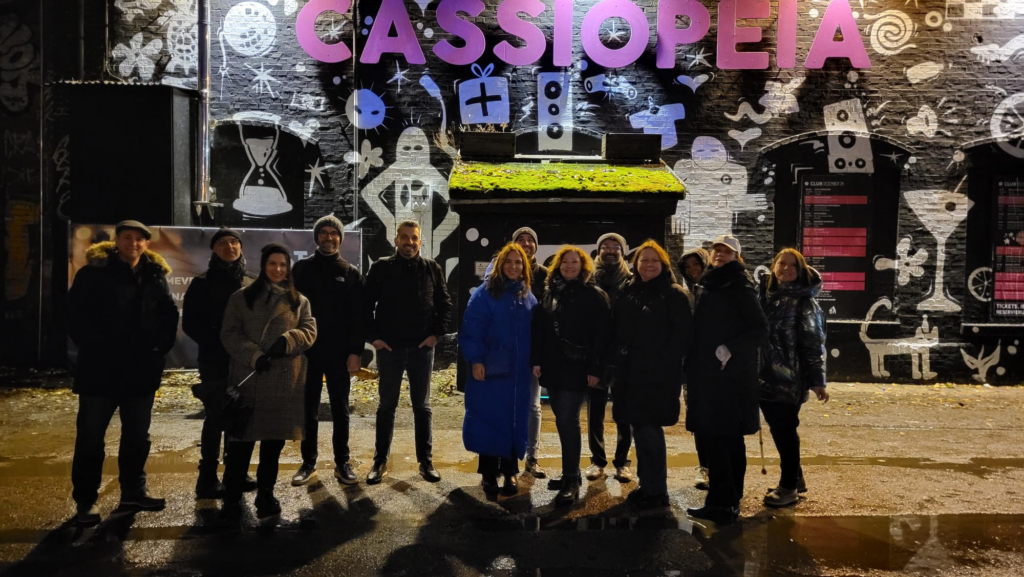
ERA-Shuttle delegates on the way to a Christmas market in Berlin. Photo credit: Sonia Utermann.

